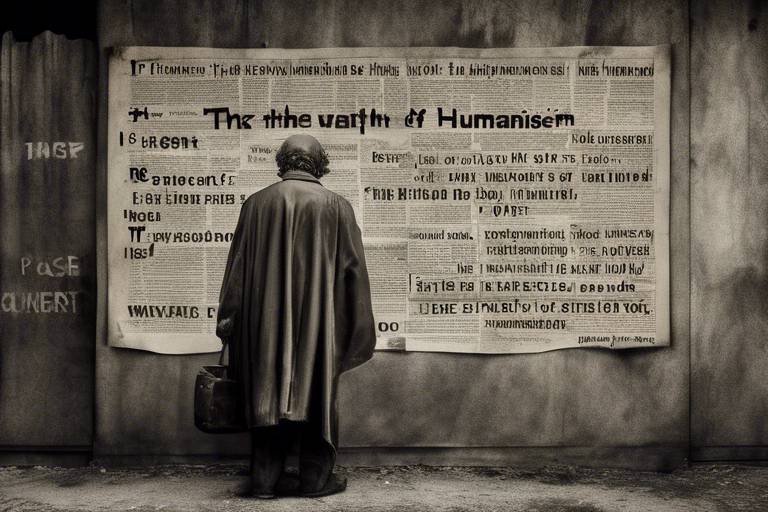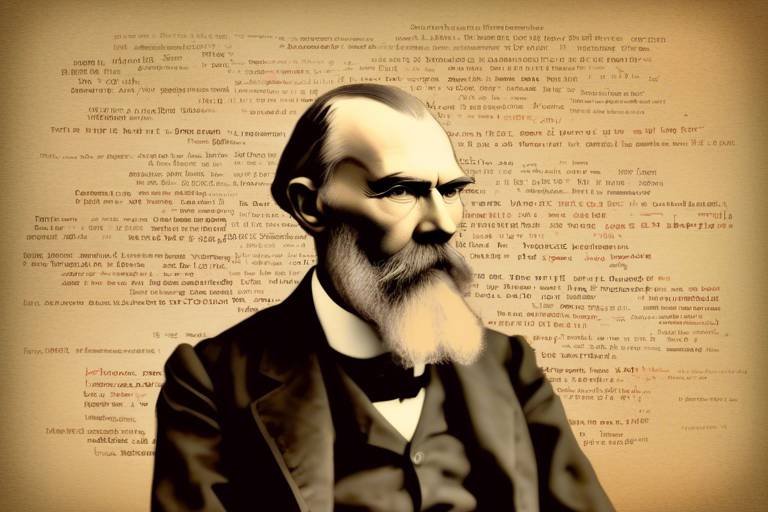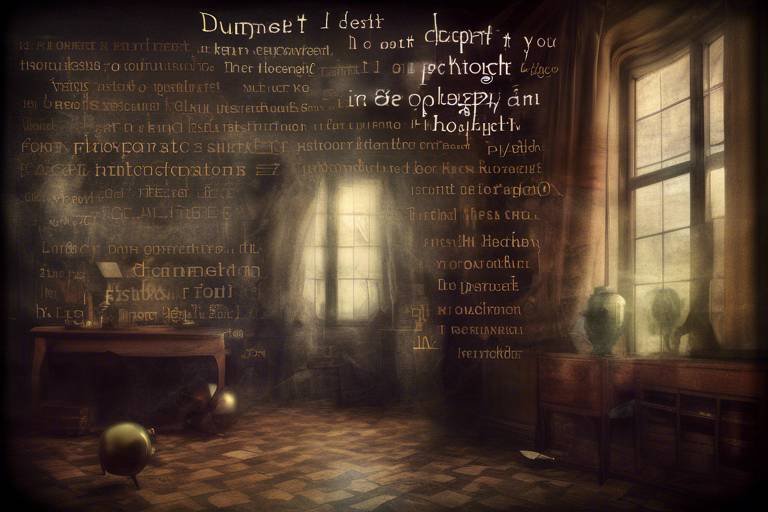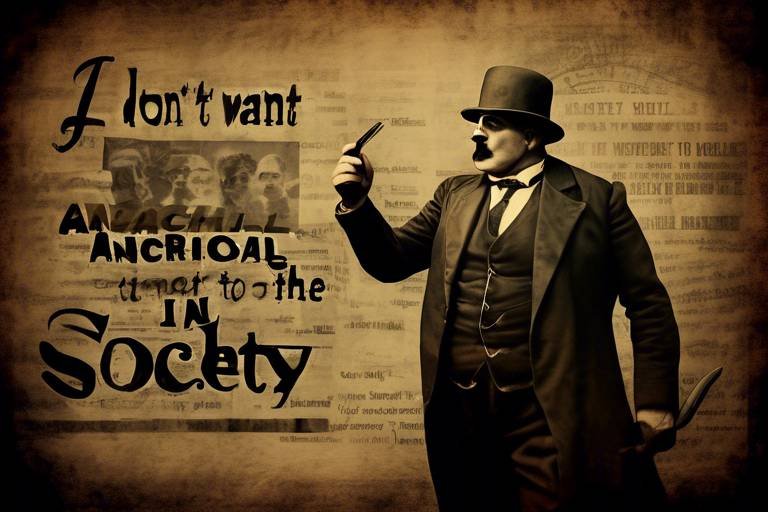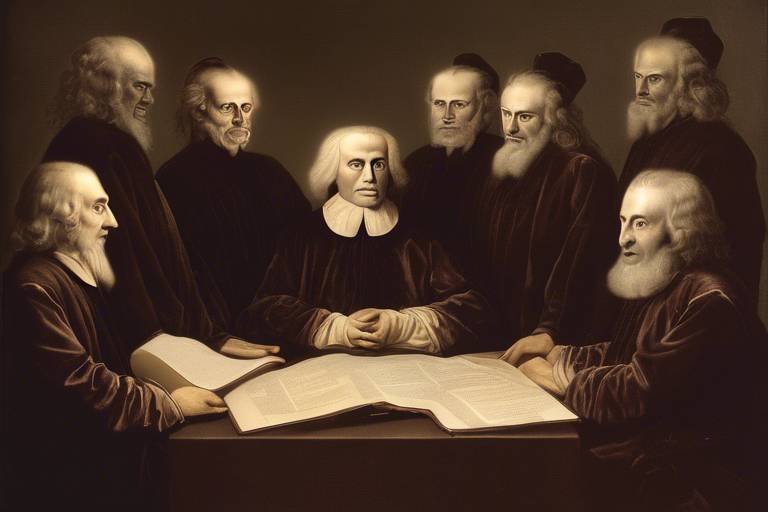The Philosophy of Humanism: Past and Present
Humanism, at its core, is a celebration of human potential and the inherent value of each individual. This philosophy has evolved significantly over the centuries, shaping our understanding of ethics, culture, and education. As we dive into the depths of humanism, we will uncover its historical roots, explore the key figures who championed its ideals, and examine its relevance in our modern world. The journey of humanism is not just a tale of the past; it is a vibrant narrative that continues to influence our lives today.
The origins of humanism can be traced back to ancient Greece, where philosophers like Socrates, Plato, and Aristotle began to emphasize the importance of human reason and experience. These early thinkers laid the groundwork for a shift away from purely religious explanations of existence. Fast forward to the Renaissance, a period that marked a profound revival of interest in classical antiquity. This era saw the birth of a new intellectual movement—humanism—which sought to celebrate human achievements and potential. The impact of humanist thought during this time was monumental, influencing various aspects of society, including art, literature, and philosophy.
Throughout history, several influential thinkers have emerged, championing humanist ideals and shaping the course of this philosophy. Figures such as Erasmus, Thomas More, and Pico della Mirandola have made significant contributions to humanism. Erasmus, for instance, emphasized the importance of education and the study of classical texts, advocating for a more enlightened society. Thomas More's work, particularly his book Utopia, explored the potential for a just society grounded in humanist principles. Meanwhile, Pico della Mirandola's famous Oration on the Dignity of Man is often regarded as a manifesto of humanism, celebrating the unique capacity of humans to shape their own destinies.
The Renaissance was a pivotal moment in the flourishing of humanist ideas. This period saw a remarkable transformation in art and literature, driven by the belief in human potential and achievement. Artists and writers began to focus on the human experience, portraying emotions and individualism in ways that had never been seen before. The emphasis on human emotion and the beauty of the human form became central themes in art, leading to masterpieces that celebrated the human spirit.
Artists like Michelangelo and Leonardo da Vinci epitomized the humanist approach in their works. Michelangelo's sculptures, such as the David, showcased the beauty and strength of the human body, while Leonardo's paintings, including the Mona Lisa, captured the complexity of human emotion. These artists not only celebrated individualism but also challenged the prevailing religious narratives by focusing on the human experience.
In literature, figures like Dante and Shakespeare harnessed humanist principles to explore the depths of human experience. Dante's Divine Comedy reflects a journey of self-discovery and moral reflection, while Shakespeare's plays delve into the complexities of love, ambition, and morality. Their works emphasize the richness of human experience and the importance of individual choices, showcasing the profound impact of humanist thought on literature.
As we move into the modern era, humanism has experienced a resurgence, adapting to contemporary ethical discussions and the promotion of human rights. Today, modern humanism advocates for a secular approach to morality, emphasizing reason and empathy in addressing global challenges. This evolution reflects a broader understanding of what it means to be human in an increasingly complex world. The principles of humanism continue to inspire movements for social justice, equality, and community, reminding us of our shared humanity.
The influence of humanism extends into the realm of education, where it advocates for a holistic approach to learning. Humanist educators emphasize the importance of critical thinking, creativity, and the development of the whole person. This educational philosophy encourages students to engage with the world around them, fostering independent thought and a sense of responsibility towards society. In a world that often prioritizes rote memorization, humanism champions a learning experience that is rich, engaging, and transformative.
Critical thinking is at the heart of humanist education. It empowers students to question assumptions, analyze information, and develop their own perspectives. By encouraging independent thought, humanism nurtures a generation of thinkers who are not only knowledgeable but also capable of contributing meaningfully to society. This emphasis on inquiry and exploration is vital in preparing students to navigate the complexities of the modern world.
As we navigate the 21st century, humanism remains a relevant and vital philosophy. It addresses pressing global challenges, such as climate change, social inequality, and the erosion of human rights. Modern humanism fosters a sense of community and shared humanity, reminding us that we are all interconnected. By promoting values of compassion, empathy, and respect for individual dignity, humanism continues to inspire movements that seek to create a more just and equitable world.
- What is humanism? Humanism is a philosophical stance that emphasizes the value and agency of human beings, focusing on reason, ethics, and justice.
- How did humanism influence the Renaissance? Humanism inspired artists and thinkers during the Renaissance to focus on human potential and individual achievement, leading to significant advancements in art and literature.
- What role does humanism play in modern education? Humanism advocates for a holistic approach to education, promoting critical thinking, creativity, and the development of the whole person.
- How is humanism relevant today? Humanism addresses contemporary issues such as social justice, human rights, and ethical decision-making, fostering a sense of community and shared responsibility.
The Historical Roots of Humanism
Humanism, as a philosophical stance, has deep historical roots that can be traced back to ancient civilizations. Its emergence is akin to a seed planted in the fertile soil of human thought, nurtured by the winds of change and the waters of intellectual curiosity. The journey of humanism begins in ancient Greece, where thinkers like Socrates, Plato, and Aristotle laid the groundwork for a worldview that emphasized human potential and rationality. These philosophers were not just pondering abstract ideas; they were exploring the very essence of what it means to be human, focusing on ethics, politics, and the nature of knowledge.
As we move through history, we see the seeds of humanism sprouting during the Middle Ages, albeit in a more subdued form. While the dominant influence of the Church overshadowed many aspects of life, there were still sparks of humanist thought. Figures like St. Augustine began to weave human experience into theological discussions, emphasizing the importance of individual conscience and moral reasoning. This blending of human experience with spiritual inquiry set the stage for the full bloom of humanism during the Renaissance.
The Renaissance, often referred to as the "rebirth" of classical knowledge, was a pivotal moment for humanism. It was during this period, roughly from the 14th to the 17th century, that humanist thought flourished. Artists, writers, and scholars looked back to the classical texts of Greece and Rome, drawing inspiration from the ideals of beauty, proportion, and the celebration of human achievement. This cultural revival was not just about rediscovering ancient works; it was about reinterpreting them through a lens that valued human experience and intellect.
One of the hallmarks of Renaissance humanism was its emphasis on individualism. Artists like Michelangelo and Leonardo da Vinci began to explore the depths of human emotion and the complexities of the human form in their works. In literature, writers such as Dante and Shakespeare delved into the human experience, portraying characters that grappled with moral dilemmas and the intricacies of life. This shift marked a significant departure from the medieval focus on divine authority and the afterlife, placing human beings at the center of discourse.
To further illustrate the transformation during the Renaissance, we can look at the contributions of key figures:
| Figure | Contribution |
|---|---|
| Erasmus | Critiqued the Church and emphasized education and moral philosophy. |
| Thomas More | Wrote "Utopia," exploring social and political ideals through a humanist lens. |
| Pico della Mirandola | Promoted the idea of human dignity and potential in "Oration on the Dignity of Man." |
As we reflect on the historical roots of humanism, it's clear that this movement was not merely a reaction against the prevailing norms of its time. Rather, it was a profound affirmation of human potential and creativity. The echoes of humanist thought can still be heard today, resonating in our discussions about ethics, culture, and education. By understanding where humanism came from, we can better appreciate its enduring relevance in our contemporary world.

Key Figures in Humanist Thought
When we think about the evolution of humanism, it’s impossible to overlook the **influential thinkers** who shaped its trajectory. These individuals didn’t just contribute ideas; they ignited a **revolution of thought** that challenged the status quo and inspired generations. Among them, Erasmus, Thomas More, and Pico della Mirandola stand out as titans of humanist philosophy, each bringing their unique perspectives and insights that continue to resonate today.
Erasmus, often referred to as the "Prince of the Humanists," was a Dutch scholar whose writings emphasized the importance of education and the study of classical texts. His work, In Praise of Folly, is a satirical critique of the Church and society, advocating for a return to simple Christian values. Erasmus believed that through education and critical thinking, individuals could achieve moral improvement. His famous quote, “The main hope of a nation lies in the proper education of its youth,” underscores his belief in the transformative power of knowledge.
Then there’s Thomas More, a contemporary of Erasmus, whose work Utopia presents a vision of an ideal society based on humanist principles. More’s exploration of social justice and communal living was revolutionary for his time. He questioned the social and political structures of the day, advocating for a society that prioritized the welfare of its citizens. His ideas about governance and ethics continue to inspire discussions on **social equity** and **moral responsibility**.
Another pivotal figure is Pico della Mirandola, whose work Oration on the Dignity of Man is often hailed as a manifesto of humanism. In this text, he eloquently argues that humans possess the unique ability to shape their own destinies, a radical departure from the deterministic views of the Middle Ages. Pico’s assertion that “man is the measure of all things” encapsulates the humanist belief in the **potential of the individual**. His ideas laid the groundwork for later philosophical thought, emphasizing the value of human agency and creativity.
These thinkers not only contributed to the academic landscape of their time but also influenced **art**, **literature**, and **politics**. Their legacies are woven into the fabric of modern humanist thought, reminding us that the quest for knowledge, ethical living, and social justice is an ongoing journey. As we navigate contemporary issues, the wisdom of these figures serves as a guiding light, encouraging us to reflect on our values and the world we wish to create.
In summary, the contributions of Erasmus, Thomas More, and Pico della Mirandola illustrate the diverse paths of humanist thought. They remind us that the journey of humanism is not just about the past; it’s about how we can apply these timeless principles to our lives today. By embracing the ideals of these key figures, we can foster a society that values **critical thinking**, **compassion**, and the **pursuit of knowledge**.
- What is humanism? Humanism is a philosophical stance that emphasizes the value and agency of human beings, focusing on critical thinking and evidence over established doctrine or faith.
- Who are some other notable humanist thinkers? In addition to Erasmus, Thomas More, and Pico della Mirandola, other notable figures include Michel de Montaigne and John Locke.
- How does humanism influence modern education? Humanism promotes critical thinking, creativity, and the development of the whole person, encouraging students to engage with the world around them.
- What role does humanism play in contemporary society? Humanism continues to influence discussions on ethics, human rights, and social justice, advocating for a more equitable and compassionate world.

The Renaissance and Humanism
The Renaissance was more than just a period in history; it was a reawakening of human potential and creativity that profoundly shaped the course of Western civilization. Emerging in the 14th century, this cultural movement marked a shift from the medieval focus on the divine and the afterlife to a renewed interest in the human experience and the natural world. Humanism, with its emphasis on the value and agency of human beings, played a pivotal role during this transformative era. It encouraged individuals to explore their own capabilities, leading to groundbreaking advancements in art, literature, and science.
At the heart of the Renaissance was the idea that human beings are capable of greatness. This was a significant departure from the previous era, where the emphasis was predominantly on religious dogma and the afterlife. Humanists believed that by studying classical texts from ancient Greece and Rome, individuals could gain insights into human nature and society. This revival of classical learning inspired artists, thinkers, and writers to push the boundaries of what was possible, leading to a flourishing of creativity that still resonates today.
Art during the Renaissance was profoundly influenced by humanist principles. Artists like Michelangelo and Leonardo da Vinci sought to capture the essence of humanity in their works. They focused on the realism of human emotion, anatomy, and individual expression, breaking away from the more stylized and religiously-focused art of the Middle Ages. For instance, Michelangelo's David not only showcases the artist's mastery of anatomy but also embodies the spirit of humanism through its representation of human strength and beauty.
Similarly, literature during this period reflected humanist ideals. Writers such as Dante and Shakespeare explored themes of human experience, morality, and the complexities of life. Dante’s Divine Comedy is a profound exploration of the human condition, while Shakespeare’s plays delve into the intricacies of human emotions and relationships. These literary works not only entertained but also provoked thought and discussion about what it means to be human.
The Renaissance was also a time of scientific inquiry and exploration, fueled by the humanist belief in the power of observation and reason. Thinkers like Copernicus and Galileo challenged long-held beliefs about the universe, paving the way for modern science. This spirit of inquiry encouraged individuals to question traditional authority and seek knowledge through empirical evidence, which was a hallmark of humanist philosophy.
In summary, the Renaissance was a period where humanism flourished, transforming art, literature, and science. It encouraged a celebration of human achievement and potential, laying the groundwork for the modern world. The legacy of this vibrant era continues to influence contemporary thought and creativity, reminding us of the enduring power of the human spirit.
- What is humanism? Humanism is a philosophical stance that emphasizes the value and agency of human beings, focusing on human interests, values, and dignity.
- How did the Renaissance influence humanism? The Renaissance revived classical knowledge and emphasized human potential, leading to a flourishing of humanist thought in art, literature, and science.
- Who were some key figures of the Renaissance humanism? Key figures include artists like Michelangelo and Leonardo da Vinci, as well as writers such as Dante and Shakespeare.
- What are the main themes of humanism in literature? Major themes include the exploration of human experience, morality, individuality, and the complexities of life.

Humanism in Art
Humanism has profoundly influenced the world of art, particularly during the Renaissance, a period that marked a significant shift in how artists perceived the human experience. Unlike the medieval focus on religious themes and divine representation, humanist artists began to explore the beauty of the human form and the intricacies of human emotion. This transformation can be seen in the works of renowned artists like Michelangelo and Leonardo da Vinci, who celebrated individuality and the potential of mankind through their masterpieces.
Michelangelo's iconic sculpture, David, is a prime example of humanist ideals in art. Carved from a single block of marble, this statue not only represents the biblical hero but also embodies the Renaissance belief in the power and beauty of the human body. The intricate details of David's muscles and the expression of determination on his face capture the essence of human potential, echoing the humanist philosophy that emphasizes the importance of human experience and achievement.
Similarly, Leonardo da Vinci's works, such as the Mona Lisa and The Last Supper, delve into the complexities of human emotion and relationships. The enigmatic smile of the Mona Lisa invites viewers to ponder the depths of her thoughts and feelings, showcasing a shift from the static, emotionless figures of earlier art to dynamic, relatable characters. Da Vinci's meticulous attention to detail and use of perspective not only highlight the beauty of the human form but also reflect a deep understanding of human psychology.
Furthermore, the humanist approach to art encouraged artists to draw inspiration from classical antiquity. They studied ancient Greek and Roman sculptures, literature, and philosophy to create works that celebrated human achievement. This revival of classical themes led to a flourishing of art that emphasized realism, proportion, and perspective. Artists began to depict not just religious figures but also everyday people and mythological subjects, reflecting a broader understanding of the human experience.
In addition to Michelangelo and da Vinci, other artists like Raphael and Titian also embraced humanist principles. Raphael's School of Athens is a visual representation of the intellectual spirit of the Renaissance, featuring great thinkers such as Plato and Aristotle in a harmonious setting. This painting symbolizes the humanist belief in the power of knowledge and the importance of dialogue in the pursuit of truth.
In summary, the influence of humanism on art has been both profound and lasting. By shifting the focus from the divine to the human, artists have created works that resonate with audiences on a personal level. This celebration of human potential and emotion continues to inspire contemporary artists and remains a cornerstone of artistic expression today.
- What is humanism in art?
Humanism in art refers to the movement that emphasizes the value and agency of human beings, focusing on human experience, emotion, and individuality, particularly during the Renaissance. - How did humanism influence Renaissance artists?
Humanism encouraged Renaissance artists to explore classical themes, portray human emotions, and depict the human body realistically, leading to a significant transformation in artistic expression. - Who are some key artists associated with humanism?
Key artists include Michelangelo, Leonardo da Vinci, Raphael, and Titian, all of whom incorporated humanist principles into their works.

Humanism in Literature
When we think about humanism in literature, we can't help but feel a sense of awe at how it has shaped the way we understand the human experience. From the poignant verses of Dante to the complex characters crafted by Shakespeare, humanist literature invites us to explore the depths of our emotions, morality, and the intricacies of life itself. It’s like stepping into a vibrant tapestry where each thread represents a unique story, reflecting the struggles and triumphs of humanity.
At its core, humanism in literature emphasizes the importance of the individual. It encourages writers to delve into the human condition, examining our desires, fears, and aspirations. This approach not only enriches the narrative but also resonates with readers, allowing them to see themselves in the characters and situations depicted on the page. For instance, in Dante's Divine Comedy, we witness a profound journey of self-discovery, where the protagonist navigates through hell, purgatory, and heaven, ultimately seeking redemption and understanding. This journey mirrors our own quests for meaning and morality in a complex world.
Similarly, Shakespeare's works are a treasure trove of humanist thought. His plays tackle themes such as love, ambition, betrayal, and the quest for identity. Characters like Hamlet and Macbeth are not just figures in a story; they represent the struggles of real people grappling with their own choices and the consequences that follow. Shakespeare's ability to capture the essence of human emotions makes his work timeless and universally relatable.
In addition to exploring individual experiences, humanist literature also reflects societal values and challenges. It serves as a mirror to the world, prompting readers to question societal norms and injustices. For example, the works of authors like John Milton and Geoffrey Chaucer delve into themes of freedom, justice, and the human spirit's resilience. These narratives often challenge the status quo, advocating for a more just and equitable society.
also encourages a sense of empathy and understanding among readers. By immersing ourselves in diverse narratives, we gain insights into different cultures, perspectives, and experiences. This exposure fosters a sense of shared humanity, reminding us that despite our differences, we all grapple with similar emotions and dilemmas.
To illustrate the impact of humanism on literature, consider the following table that highlights key authors and their contributions to humanist themes:
| Author | Key Work | Humanist Themes |
|---|---|---|
| Dante Alighieri | Divine Comedy | Redemption, morality, self-discovery |
| William Shakespeare | Hamlet | Existentialism, human emotion, morality |
| John Milton | Paradise Lost | Free will, justice, human fallibility |
| Geoffrey Chaucer | The Canterbury Tales | Social commentary, morality, human nature |
In conclusion, humanism has left an indelible mark on literature, enriching our understanding of ourselves and the world around us. By celebrating the individual and exploring the complexities of human existence, humanist literature continues to inspire, provoke thought, and foster connections among readers. So, the next time you pick up a book, remember that it’s not just a story; it’s a reflection of our shared humanity, inviting you to embark on your own journey of exploration and understanding.
- What is humanism in literature?
Humanism in literature refers to a movement that emphasizes the value and agency of human beings, focusing on individual experiences and the human condition.
- Which authors are known for their humanist themes?
Notable authors include Dante Alighieri, William Shakespeare, John Milton, and Geoffrey Chaucer, each contributing significantly to humanist literature.
- How does humanism influence modern literature?
Humanism continues to inspire modern writers to explore themes of identity, morality, and social justice, encouraging readers to engage with diverse perspectives.

Modern Humanism: A Contemporary Perspective
In the whirlwind of the 21st century, the philosophy of humanism has not only persisted but has also undergone a remarkable transformation, adapting to the complexities of our modern lives. Today, modern humanism is a beacon of hope, advocating for individual rights, social justice, and the intrinsic value of every human being. It urges us to look beyond the confines of traditional doctrines and embrace a worldview that celebrates human dignity and potential.
One of the most significant aspects of modern humanism is its emphasis on secularism. In an age where religious ideologies often clash, humanism provides a framework for dialogue and understanding, free from dogma. This secular approach allows for a focus on shared human experiences and ethical considerations that transcend cultural and religious boundaries. It asks us to consider questions like, "What does it mean to live a good life?" and "How can we create a just society?"—questions that resonate with people from all walks of life.
Moreover, modern humanism plays a crucial role in the ongoing fight for human rights. As we witness movements advocating for equality and justice, humanism stands at the forefront, championing causes such as gender equality, racial justice, and LGBTQ+ rights. It reminds us that the struggle for human rights is not just a political issue but a deeply human one. The philosophy encourages us to engage with these issues actively, fostering a sense of community and shared responsibility.
In contemporary ethical discussions, humanist thought pushes us to consider the implications of our actions on a global scale. For instance, in the face of climate change, humanism advocates for sustainable practices that not only benefit humanity but also respect our planet. It prompts us to ask, "How can we ensure a livable world for future generations?" By prioritizing the well-being of both people and the environment, modern humanism encourages a holistic approach to problem-solving.
As we navigate the complexities of modern life, the principles of humanism continue to guide individuals and communities alike. It inspires us to foster a sense of empathy and compassion, urging us to recognize our interconnectedness. It challenges us to break down barriers and embrace diversity as a strength rather than a division. In essence, modern humanism is not just a relic of the past; it is a vibrant, evolving philosophy that resonates with the challenges and opportunities of our contemporary world.
As we look to the future, the relevance of humanism becomes increasingly clear. It serves as a reminder that despite our differences, we share a common humanity. By embracing the core tenets of humanism—reason, ethical living, and a commitment to the greater good—we can work together towards a more just and equitable society.
- What is modern humanism? Modern humanism is a philosophical stance that emphasizes the value and agency of human beings, focusing on ethics, reason, and justice without reliance on religious doctrines.
- How does humanism apply to social issues today? Humanism advocates for individual rights and social justice, addressing issues like equality, environmental sustainability, and human rights.
- Can humanism coexist with religious beliefs? Yes, many people find that humanism can coexist with their personal beliefs, as it emphasizes shared human values and ethics over specific religious doctrines.

Humanism and Education
Humanism has profoundly influenced educational practices throughout history, advocating for a holistic approach to learning that emphasizes the development of the whole person. This philosophy encourages educators to focus not just on the transmission of knowledge, but also on nurturing critical thinking, creativity, and emotional intelligence in students. Imagine a classroom where students are not merely passive recipients of information, but active participants in their learning journey. This is the essence of humanist education.
At the heart of humanist education lies the belief that every individual possesses unique potential and that education should be tailored to unlock this potential. This approach fosters a learning environment where students feel valued and empowered to express themselves. For instance, in a humanist classroom, discussions are encouraged, and students are prompted to question the status quo. This cultivates a sense of curiosity and a desire for lifelong learning.
One of the key components of humanist education is the emphasis on critical thinking. Educators who embrace this philosophy understand that teaching students how to think critically is far more important than simply teaching them what to think. By engaging students in debates, problem-solving activities, and reflective exercises, they learn to analyze information, evaluate different perspectives, and make informed decisions. This skill set is essential not only for academic success but also for navigating the complexities of modern life.
Moreover, humanism promotes creativity as a vital aspect of education. In a world that constantly evolves, the ability to think creatively and approach problems from innovative angles is invaluable. Humanist educators often incorporate arts and humanities into their curricula, allowing students to explore their creative sides. Whether through writing, music, or visual arts, these disciplines help students express their thoughts and emotions, fostering a deeper understanding of themselves and the world around them.
Furthermore, humanism in education emphasizes the importance of social responsibility and ethical considerations. Students are encouraged to engage with their communities, understand diverse perspectives, and develop a sense of empathy. This is particularly vital in today’s global society, where collaboration and understanding across cultures are crucial. By instilling these values, humanist education prepares students not just for jobs, but for meaningful lives as engaged citizens.
To illustrate the impact of humanism on education, consider the following table that outlines some key characteristics of humanist education compared to traditional education:
| Aspect | Humanist Education | Traditional Education |
|---|---|---|
| Focus | Whole person development | Knowledge acquisition |
| Learning Style | Active participation | Passive reception |
| Critical Thinking | Encouraged | Limited |
| Creativity | Valued and nurtured | Often overlooked |
| Social Responsibility | Central to curriculum | Minimal emphasis |
In conclusion, the influence of humanism on education is profound and far-reaching. By fostering critical thinking, creativity, and a sense of social responsibility, humanist educators prepare students not only for academic success but also for life beyond the classroom. As we continue to face global challenges, the principles of humanism in education remain more relevant than ever, inspiring a generation of learners to think critically, act compassionately, and contribute positively to society.
- What is humanism in education? Humanism in education is an approach that emphasizes the development of the whole person, focusing on critical thinking, creativity, and social responsibility.
- How does humanism influence teaching methods? Humanism encourages active participation, discussion, and exploration, allowing students to engage deeply with the material and develop their own understanding.
- Why is critical thinking important in humanist education? Critical thinking is essential as it helps students analyze information, evaluate different viewpoints, and make informed decisions, preparing them for real-world challenges.
- Can humanist principles be applied in modern classrooms? Yes, many educators today incorporate humanist principles to create inclusive and engaging learning environments that prioritize student well-being and growth.
The Role of Critical Thinking
In the realm of humanism, critical thinking emerges as a cornerstone of education and personal development. It’s not just about memorizing facts or regurgitating information; rather, it’s about cultivating the ability to analyze, evaluate, and synthesize ideas. Imagine critical thinking as the compass that guides us through the dense forest of information we encounter daily. Without it, we risk getting lost in a maze of opinions and misinformation.
Critical thinking encourages individuals to question assumptions, challenge the status quo, and seek evidence before forming conclusions. This is particularly vital in today’s world, where we are bombarded with a barrage of information from various sources, many of which may not have our best interests at heart. By fostering a culture of inquiry, humanism empowers individuals to navigate these challenges effectively.
Moreover, critical thinking is not just an academic skill; it’s a life skill. It allows us to make informed decisions, understand different perspectives, and engage in meaningful discussions. In educational settings, when students are encouraged to think critically, they become not only better learners but also more engaged citizens. They learn to appreciate the value of diverse viewpoints and the importance of empathy in understanding the human experience.
Here’s a quick breakdown of how critical thinking enriches humanist education:
- Encourages Independent Thought: Students are taught to form their own opinions rather than simply accepting what they are told.
- Fosters Analytical Skills: Learners develop the ability to dissect arguments and assess their validity.
- Promotes Creativity: Critical thinking encourages innovative solutions to problems, allowing for a more dynamic learning environment.
- Enhances Communication: Through discussions and debates, students learn to articulate their thoughts clearly and respectfully.
As we delve deeper into the 21st century, the role of critical thinking within humanism is more crucial than ever. It equips individuals to tackle pressing global issues, from climate change to social inequality. By applying critical thinking, we can dissect complex problems, explore various solutions, and collaborate with others to implement effective strategies. The humanist approach, with its emphasis on the intrinsic value of each person, aligns perfectly with the need for critical thinkers who can advocate for social justice and human rights.
In summary, the role of critical thinking in humanism extends far beyond the classroom. It’s about nurturing a mindset that values inquiry, embraces complexity, and fosters a sense of responsibility toward oneself and the broader community. As we continue to navigate an increasingly complex world, let’s champion critical thinking as a vital component of our humanist ideals.
Q1: What is critical thinking?
A1: Critical thinking is the ability to think clearly and rationally, understanding the logical connection between ideas. It involves questioning assumptions, evaluating evidence, and forming reasoned conclusions.
Q2: Why is critical thinking important in education?
A2: Critical thinking is essential in education as it promotes independent thought, enhances problem-solving skills, and prepares students to engage meaningfully with the world around them.
Q3: How can I improve my critical thinking skills?
A3: You can improve your critical thinking skills by practicing questioning assumptions, engaging in discussions, analyzing different viewpoints, and reflecting on your thought processes.
Q4: Is critical thinking only relevant in academic settings?
A4: No, critical thinking is relevant in all aspects of life, including personal decision-making, professional environments, and civic engagement.

Humanism in the 21st Century
As we navigate through the complexities of the 21st century, humanism remains a vital force, adapting to the ever-changing landscape of global society. In an era marked by rapid technological advancement and social upheaval, humanism offers a framework that emphasizes the intrinsic value of human beings and the importance of ethical considerations in our decisions. It’s fascinating to see how this age-old philosophy continues to resonate with contemporary issues, providing insights that are both relevant and necessary.
One of the most significant aspects of modern humanism is its role in addressing global challenges. From climate change to inequality, humanists advocate for solutions that prioritize human welfare and dignity. This approach encourages a collective responsibility among individuals and nations to work towards a more sustainable and equitable world. For instance, the humanist perspective on environmental issues is not just about preserving nature; it's about ensuring that future generations have the opportunity to thrive in a healthy environment. This interconnectedness echoes the humanist belief that we are all part of a larger community, bound by our shared humanity.
Furthermore, the resurgence of humanist thought has been instrumental in promoting social justice and human rights. In a time when many face discrimination and marginalization, humanism champions the idea that every individual deserves respect and equal treatment. This philosophy has inspired numerous movements aimed at dismantling systemic barriers and advocating for the rights of the oppressed. Organizations around the world are increasingly adopting humanist principles to guide their missions, reflecting a growing recognition of the need for ethical frameworks in activism.
Another noteworthy development is the rise of secular humanism, which emphasizes reason and scientific inquiry as tools for understanding the world. In a society where misinformation can spread rapidly, the humanist commitment to critical thinking and evidence-based reasoning is more crucial than ever. Educational institutions are beginning to integrate humanist principles into their curricula, fostering environments where students learn to question, analyze, and engage with the world around them. This shift not only equips students with the necessary skills to navigate modern challenges but also instills a sense of responsibility towards their communities and the planet.
As we look to the future, it’s clear that humanism is not just surviving; it is evolving. The challenges we face today require innovative solutions, and humanism offers a guiding light. By focusing on empathy, compassion, and a commitment to the common good, humanism encourages us to foster connections and build communities that celebrate diversity while promoting unity. Whether through art, literature, or social movements, the humanist spirit inspires individuals to strive for a better world, reminding us that our shared humanity is our greatest strength.
- What is humanism?
Humanism is a philosophical stance that emphasizes the value and agency of human beings, focusing on the importance of human rights, ethics, and reason.
- How is humanism relevant today?
Humanism addresses contemporary issues such as social justice, environmental sustainability, and the promotion of human rights, making it highly relevant in today's society.
- What role does education play in humanism?
Education grounded in humanist principles fosters critical thinking, creativity, and ethical reasoning, preparing individuals to tackle global challenges.
- Can humanism coexist with religious beliefs?
Yes, many people find that humanism can complement their religious beliefs, focusing on shared values of compassion, empathy, and respect for human dignity.
Frequently Asked Questions
- What is humanism?
Humanism is a philosophical and ethical stance that emphasizes the value and agency of human beings. It advocates for a focus on human interests, values, and dignity, often in contrast to religious or supernatural views. In essence, it’s about celebrating what it means to be human and prioritizing human welfare and fulfillment.
- How did humanism originate?
The roots of humanism can be traced back to ancient Greece, where thinkers like Socrates and Plato began exploring ideas about human existence and ethics. However, it truly flourished during the Renaissance, a period marked by a renewed interest in classical learning and the arts, leading to significant developments in literature, philosophy, and visual arts.
- Who are some key figures in humanist thought?
Several influential figures have shaped humanism over the centuries. Notable humanists include Erasmus, who emphasized education and moral philosophy; Thomas More, known for his work "Utopia"; and Giovanni Pico della Mirandola, who celebrated human potential in his "Oration on the Dignity of Man." Each contributed unique perspectives that enriched the humanist tradition.
- What impact did the Renaissance have on humanism?
The Renaissance was pivotal for humanism, transforming art and literature by emphasizing individualism and human experience. Artists like Michelangelo and Leonardo da Vinci showcased human emotion and beauty, while writers like Dante and Shakespeare explored complex human themes, reflecting the humanist belief in the potential for greatness within every individual.
- How is humanism relevant today?
In the modern era, humanism continues to resonate, particularly in discussions around ethics, secularism, and human rights. It encourages a focus on reason, compassion, and social justice, addressing contemporary challenges while promoting a sense of shared humanity and community among diverse populations.
- What role does humanism play in education?
Humanism significantly influences educational practices by advocating for critical thinking, creativity, and the holistic development of students. It encourages learners to question norms, engage in independent thought, and develop a deeper understanding of themselves and the world around them, fostering a more enriching learning environment.
- How does critical thinking relate to humanism?
Critical thinking is a cornerstone of humanist education, as it empowers students to analyze information, challenge assumptions, and form their own conclusions. This approach not only nurtures intellectual independence but also cultivates a mindset that values inquiry and reflection, essential for personal and societal growth.
- What challenges does humanism address in the 21st century?
Humanism tackles various global challenges today, such as inequality, environmental issues, and social injustice. By promoting empathy, cooperation, and respect for human rights, it encourages individuals and communities to work together towards solutions that benefit all, fostering a more just and compassionate world.

